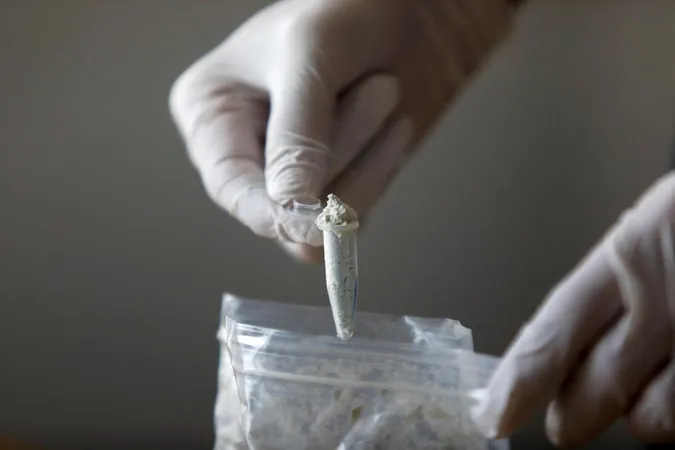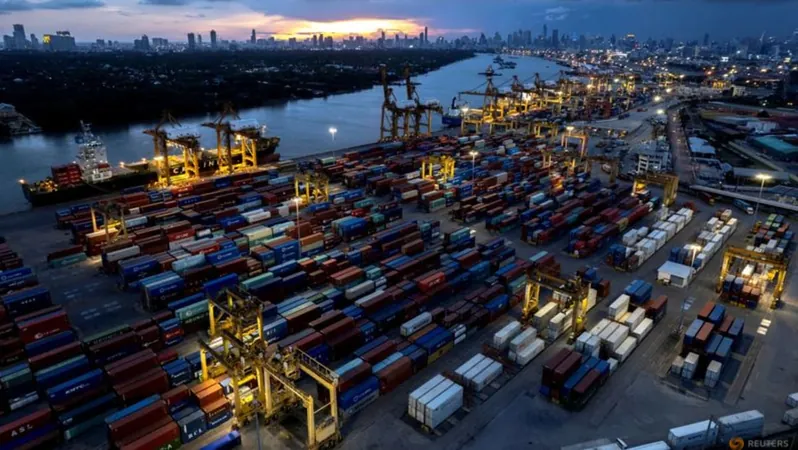
Can Trump's Trade War Combat America's Fentanyl Epidemic?
2025-03-18
Author: Siti
Introduction
As the United States grapples with a devastating fentanyl crisis, President Donald Trump’s trade war strategy against China, Mexico, and Canada appears rooted in addressing this alarming epidemic. Since the early 2000s, nearly a million Americans have lost their lives to fentanyl overdoses—an epidemic deemed one of the most lethal in history. The scale of this crisis is staggering, eclipsing even China's infamous 19th-century opium problem in potency and speed.
Understanding Fentanyl and Its Impact
Fentanyl is a synthetic opioid that is over 50 times stronger than heroin; as little as 2 milligrams can be lethal. Initially used for medical purposes to treat severe pain from conditions like cancer, its over-prescription and misuse have led to widespread addiction. In the tragic aftermath, the U.S. has witnessed over 100,000 overdose deaths every year during the peak years of 2021 and 2022, with recent studies indicating that four in ten American adults know someone who has succumbed to an overdose.
The Involvement of Foreign Nations
China has emerged as the leading supplier of precursors used in manufacturing fentanyl, while powerful Mexican cartels transform these chemicals into a deadly product that floods the U.S. market. Canada's role, while lesser, pertains mainly to smuggling as well. A kilogram of fentanyl fetches millions on the street—an alarming prospect considering how easily it can be transported.
Trump has taken a hardline stance on this crisis by introducing tariffs of 20% on Chinese goods and 25% on products from Mexico and Canada—asserting these measures may pressure these nations to curb the fentanyl trade. He has also declared that drug cartels will be treated as foreign terrorist organizations and hinted at possible military strikes against them on Mexican soil.
Contrasting Strategies: Trump vs. Biden
This approach sharply contrasts with that of his predecessor, Joe Biden, who focused on addressing the crisis as a public health issue by expanding treatment programs and educational campaigns. Fortunately, evidence suggests Biden's methods have contributed to a reduction in overdose deaths.
Initial indications show Trump’s strategy might be bearing fruit. Mexico recently extradited 29 drug cartel members to the U.S., including the notorious Rafael Caro Quintero, who had been a fugitive since the 1980s. Experts point to the tariffs as a new leverage in U.S.-Mexico relations, noting Mexico's newfound cooperation in extraditing drug traffickers and increasing border patrol efforts.
However, experts caution that the sustainability of this approach remains doubtful. Over-reliance on punitive measures like military interventions could destabilize cooperative efforts with Mexico, where political dynamics are precarious.
History and Future of Cooperation
Back in 2007, the Merida Initiative—developed during George W. Bush's presidency—was aimed at bolstering Mexico's capacity to combat drug trafficking. Current leaders have yet to indicate a willingness to revive this initiative, jeopardizing future collaborations in tackling the crisis.
China's cooperation in curbing the flow of precursor chemicals poses an even more significant challenge. Experts believe that tariffs are unlikely to yield the desired results, considering China’s fluctuating responsiveness to U.S. foreign policy.
Recent investigations have unearthed a complex web of financial incentives that China may leverage, including speculation surrounding its potential role in allowing fentanyl to enter the U.S. as a form of asymmetric warfare. This has spurred U.S. officials to consider whether this could qualify as state-sponsored terrorism—a label that could have widespread ramifications.
Trump's Controversial Proposals: The Death Penalty for Drug Dealers
One of Trump's boldest propositions is to impose the death penalty on drug dealers. This plan has drawn comparisons to strict laws in countries like Singapore and has the potential to stir significant debate—in both moral and legal contexts. Yet, experts warn that simply addressing the supply chain without tackling the root demand for drugs will not resolve the crisis.
Conclusion
In the end, while Trump's trade war position and militaristic rhetoric aim to tackle the fentanyl issue, they present a complex matrix of challenges and uncertainties not easily unraveled. Despite the bold strategies and immediate outcomes, only time will tell if these methods yield a long-term solution for one of America's gravest crises.





 Brasil (PT)
Brasil (PT)
 Canada (EN)
Canada (EN)
 Chile (ES)
Chile (ES)
 Česko (CS)
Česko (CS)
 대한민국 (KO)
대한민국 (KO)
 España (ES)
España (ES)
 France (FR)
France (FR)
 Hong Kong (EN)
Hong Kong (EN)
 Italia (IT)
Italia (IT)
 日本 (JA)
日本 (JA)
 Magyarország (HU)
Magyarország (HU)
 Norge (NO)
Norge (NO)
 Polska (PL)
Polska (PL)
 Schweiz (DE)
Schweiz (DE)
 Singapore (EN)
Singapore (EN)
 Sverige (SV)
Sverige (SV)
 Suomi (FI)
Suomi (FI)
 Türkiye (TR)
Türkiye (TR)
 الإمارات العربية المتحدة (AR)
الإمارات العربية المتحدة (AR)